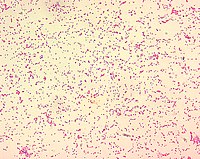
Photo from wikipedia
Brucellosis caused by facultative intracellular bacteria, Brucella, remains a global threat to both animal and human health. In this study we aimed to identify potential risk factors of bovine brucellosis and… Click to show full abstract
Brucellosis caused by facultative intracellular bacteria, Brucella, remains a global threat to both animal and human health. In this study we aimed to identify potential risk factors of bovine brucellosis and to assess the knowledge, attitudes, and practices (KAPs) of livestock keepers in Hisar, India. A standardized questionnaire was used to collate information regarding potential risk factors of bovine brucellosis and livestock owners' KAPs. A total of 127 livestock keepers were involved. Serum samples from their animals (n = 635) were tested for the presence of antibodies against Brucella by Rose Bengal Plate Test (RBPT) and indirect enzyme-linked immunosorbent assay (iELISA). Out of these, 78 (61.4%) of the herds had at least one seropositive animal, and 302 (47.6%) of the cattle were seropositive. Univariate and multivariate analysis revealed significant associations between intensive farm type (OR = 4.6; 95% CI, 1.6-16.7; P = 0.009), hygienic disposal of aborted fetuses (OR = 0.3; 95% CI, 0.08-0.9; P = 0.04) and herd seropositivity for brucellosis. The majority, 96 (75.6%) of the respondents, were males aged 18-50, and 82 (64.6%) owned a small-backyard farm. Only 51 (40.2%) of the participants knew about brucellosis; out of them, 54.9% (28/51) could not identify clinical signs of brucellosis. Six (11.8%) participants indicated abortion as the most noticeable clinical sign, and 45.1% indicated that consumption of raw milk is associated with high risk of contracting brucellosis. A large proportion of respondents confirmed that milk from their animals was regularly consumed (86.6%) and sold (59.8%) to other people. These results suggest that bovine brucellosis is endemic in Haryana, where Brucella-contaminated milk is likely being regularly sold. Brucellosis control efforts in Haryana should include education programs to raise awareness of the disease and means to control it in cattle and to prevent zoonotic transmission.
Journal Title: Tropical animal health and production
Year Published: 2021
Link to full text (if available)
Share on Social Media: Sign Up to like & get
recommendations!